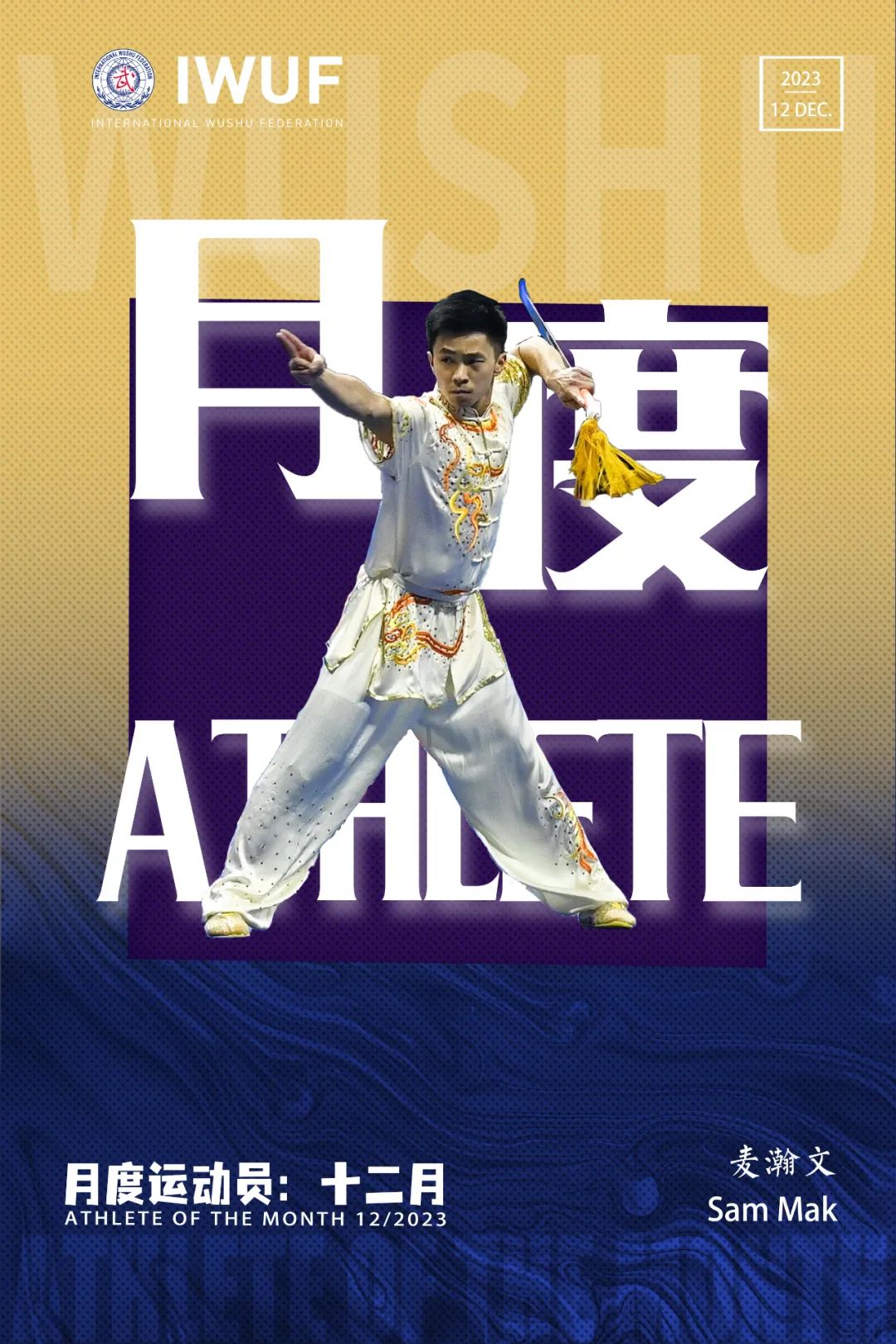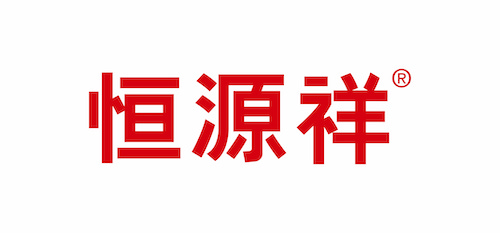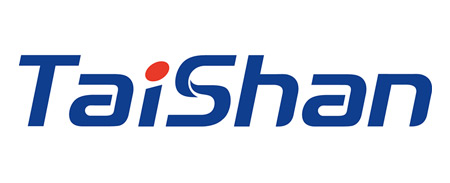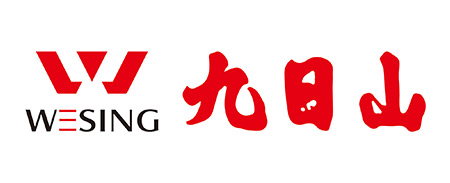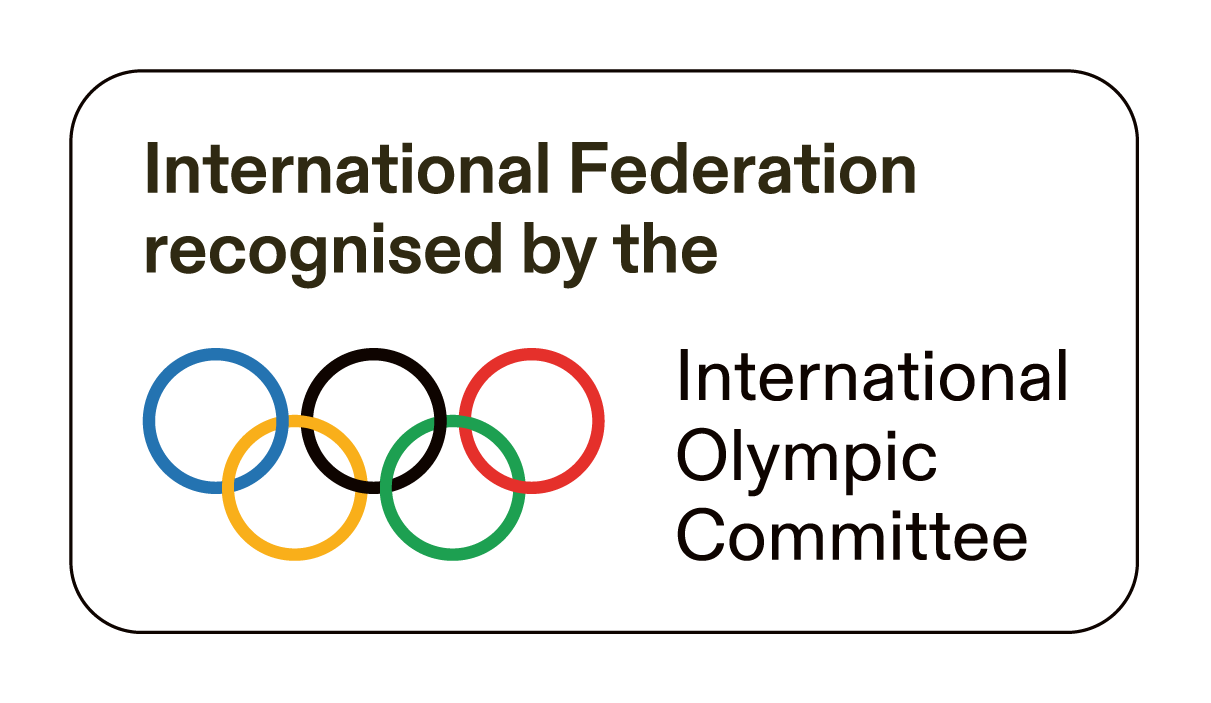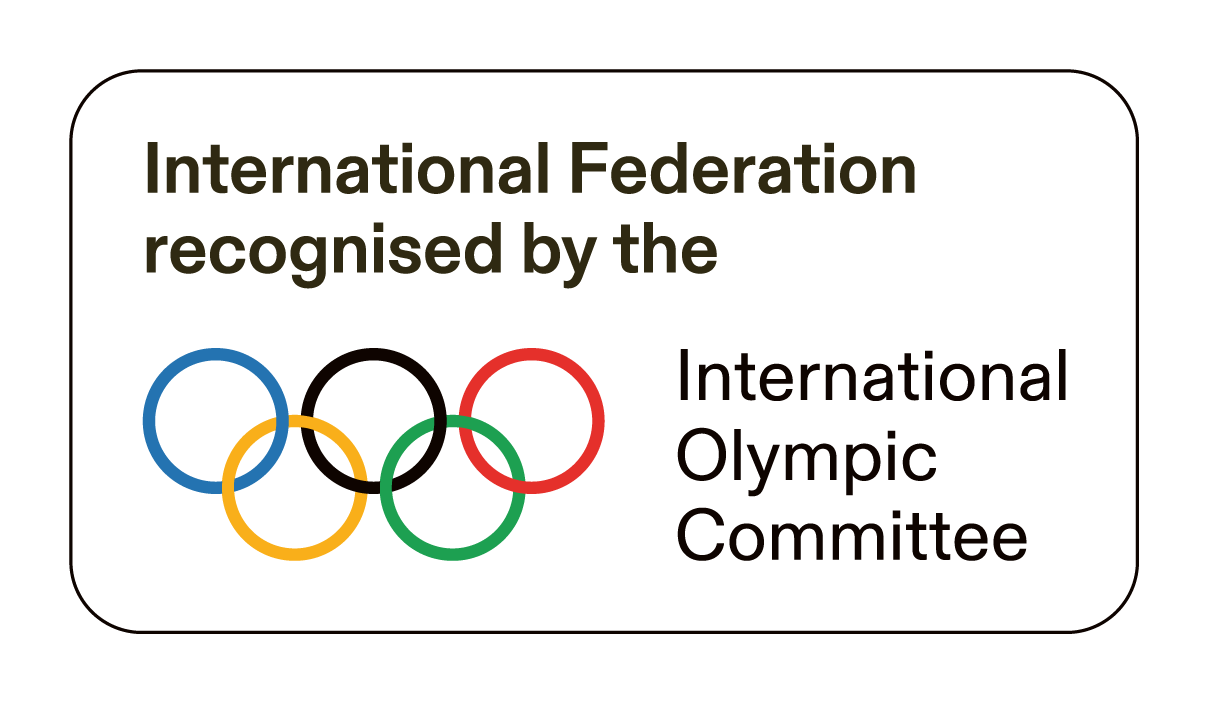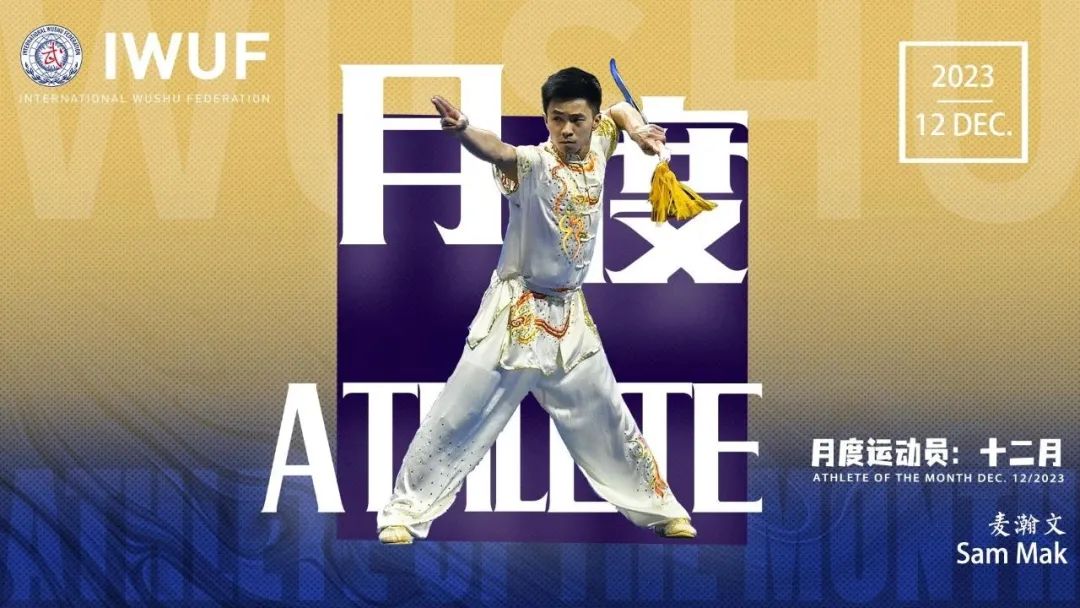
Sam Mak, 30, has been a GB team member since 2002, winning multiple world and European medals. At the 1st World Junior Wushu Championships in 2006 three was indeed a charm — he won a gold and two silver medals as the sole representative from Great Britain. As a veteran of four world championships, Sam narrowly missed the podium at the 16 th World Wushu Championships after scoring a satisfying career high in jianshu, and taking 4 th place. Sam is one of the most experienced athletes in the country and is passionate about promoting wushu in the U.K. He also shares his wushu and acting skills on the big screen;some of his filmography includes The World’s End (2013), Tomb Raider (2018) and Gangs of London (2020). As a physiotherapist with a focus on sports injury and recovery, Sam integrates these skills in his wushu coaching to ensure athletes develop the strength and conditioning required for the physical demands of wushu, and his long-term vision is to nurture, promote and develop wushu in Great Britain for the next generation.
Wushu Beginnings
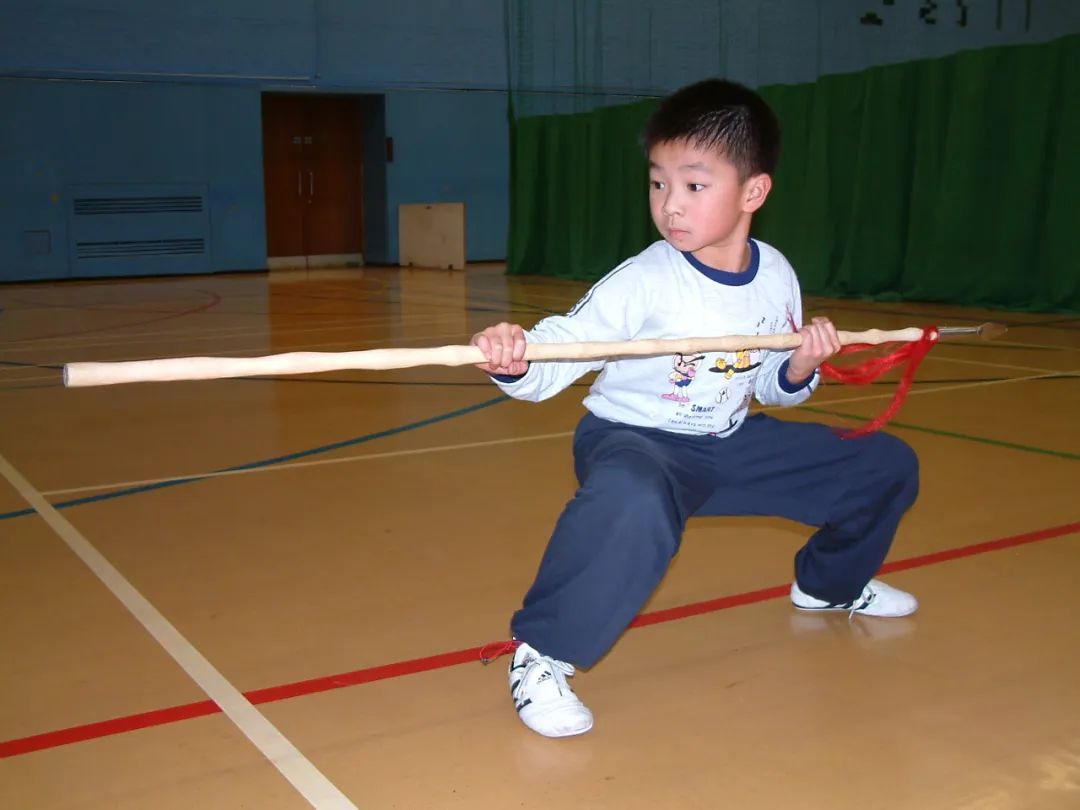
Sam was born and raised in Derbyshire in a small, picturesque town called Matlock. His parents came from Hong Kong, China and settled in England during the 70s, and Sam moved to London in 2016. “I grew up watching Jet Li and Jackie Chan movies on old VHS tapes, which was my first exposure to wushu,” he says. “I fell in love with the beauty and flow, the shapes created by the body and the intensity of the performance. I would run around the house trying to recreate Wong Fei Hung moves and fight scenes, swinging sticks around and practicing my “no-shadow kicks.” When I had eventually damaged enough furniture and ornaments, my parents decided it was time to send me to a club at the age of 5.”
Sam started training at a local club, the Derby School of Chinese Martial Arts. The club was run by Mike Donoghue, now his coach, who soon suggested that Sam should try competing. At the age of 6 Sam went to Hong Kong,China with his parents and coach and got a taste of top world level wushu attending his first WWC event. He came away hooked on the sport. Sam recalls, “I remember flying to Hong Kong,China to watch the 1999 World Championships and being blown away by the standard of the athletes, the fierceness and finesse of the movements. I knew even then, that I had to compete at the World Championships one day. When I first started to compete, the club was purely recreational and there were no other kids training at all so I represented the club on my own. We had no idea what to expect or what the standard was like in the rest of the country until we turned up at our first National Championships in 2001.”
Sam continues, “Once we decided to compete, I started doing one to one sessions with Mike once or twice a week. My dad would finish work and drive me 40 minutes to Mike’s house. The three of us would be in Mike’s garage and I’d train ji ben gong for hours. This is where I built the foundations upon which my wushu would develop. I remember getting treated to a Happy Meal on the way back!”
Eventually, in 2002 and aged 9, Sam was ready to compete in his first tournament, the National Championships in Reading. He remembers, “I competed in first set changquan, elementary jianshu and elementary qiangshu. I remember throwing up at the side of the competition area after finishing my changquan routine from a mixture of nerves and exhaustion. I finished with two gold medals and 4 th place in qiangshu. We had no expectations so to come away with such amazing results was a complete surprise. I remember Dad playing “We are the Champions” by Queen loudly on the drive back. About two months later, I was called up to represent GB in a tri-nations tournament, where I won three gold medals.”
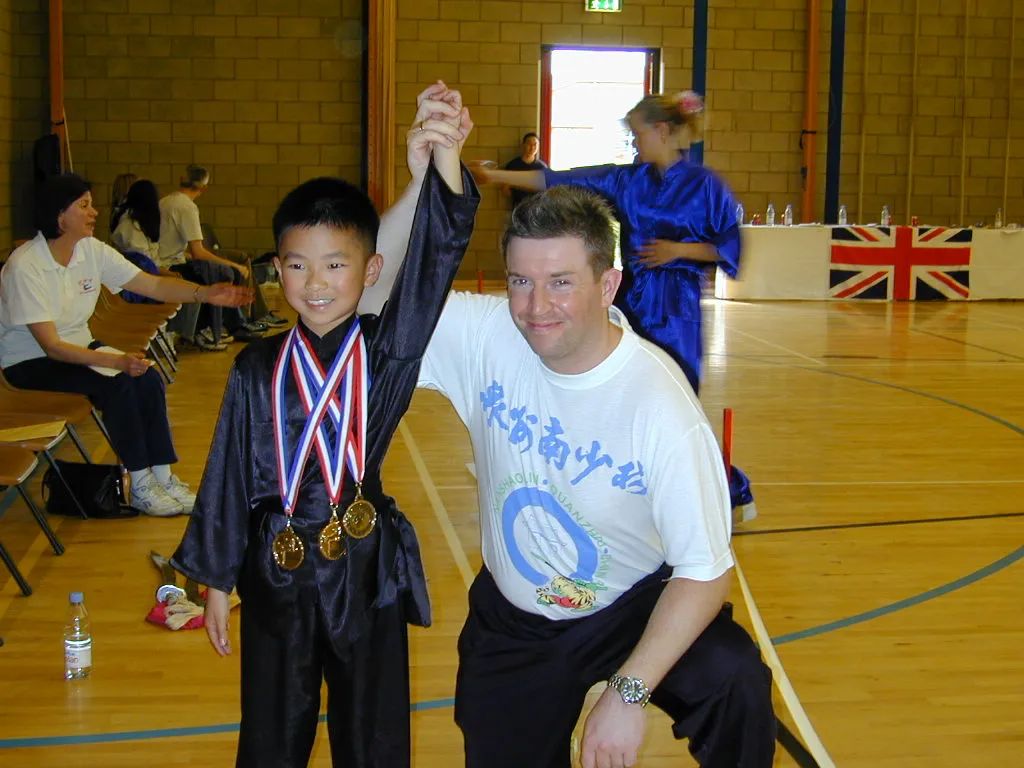
In 2003, the 1 st European Junior Wushu Championships were held in Antwerp, Belgium. Great Britain sent a large team there and Sam competed in changquan, jianshu, gunshu and also in traditional barehand, doing mantis style. He says “This was our first experience of seeing the wider European athletes. I was so intimidated by the Russian kids with their speed and power. I finished with one gold, one silver and two bronze medals, behind only the Russian athletes. Over the years, this developed into a rivalry of sorts and it really pushed my competitive standard as a junior. I started achieving great results very early on in my competitive career. But we had no expectations going into any of these competitions. It was always just our small team, doing our own thing.”
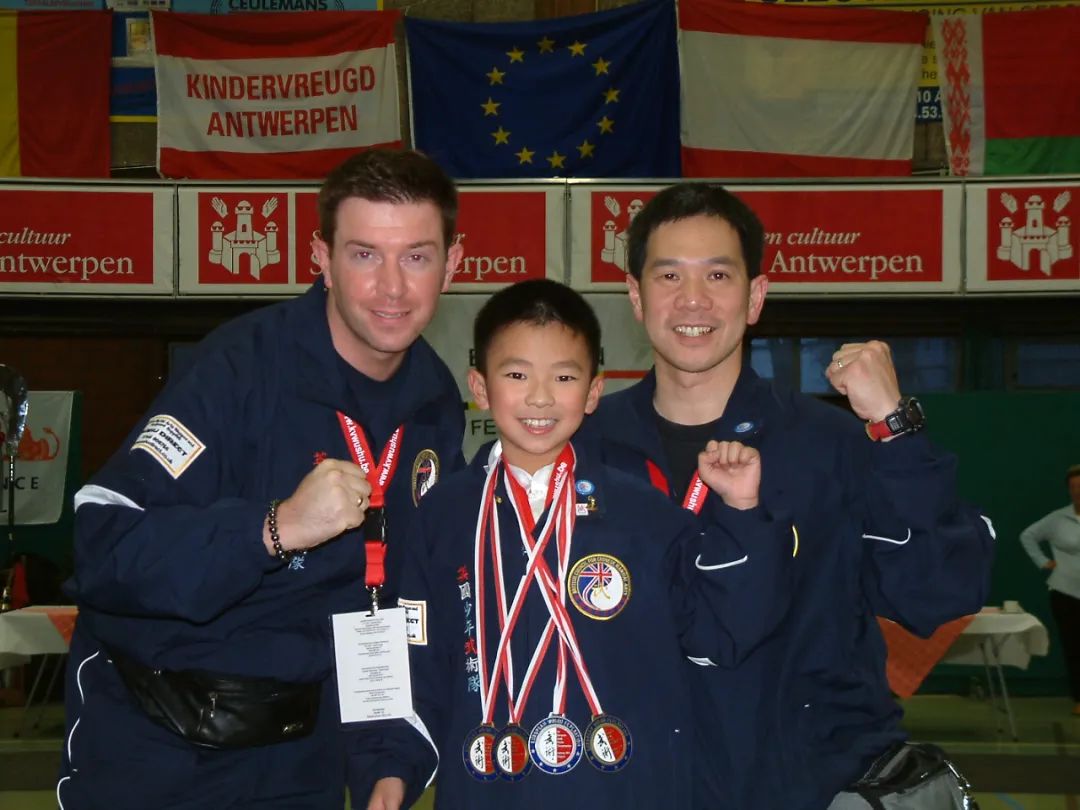
Winning at the World Junior Wushu Championships
The next natural step for Sam was to enter the World Junior Wushu Championships, the first edition of which was held in Kuala Lumpur in 2006. “Certainly,” Sam says, “the step up to the world junior championships in 2006 was huge. I was the only representative from GB so my family, Mike and I flew out to KL. I remember being quite overwhelmed as a lone athlete, seeing full squads from all around the world with incredibly high standards.”
Sam recalls, “It was one of those competitions where everything just fell into place. I pulled off some of the best wushu I’ve ever done, even to this day. I had a lot of confidence in my ability to do those elementary routines well and no fear. I just had the best time doing them.” Sam would come home triumphantly with a gold medal in jianshu, and a silver medal both in changquan and gunshu.
But, Sam says, two years later in 2008, it was different. “At 15,” he remembers, “I was still waiting to develop physically. I remember lining up next to the some of the athletes in my categories thinking they were fully grown men. So it was a challenge to keep up with the physical standard. But overall, I performed as well as I could, despite making a few group A errors. It was definitely a big learning experience during a difficult time competitively.”
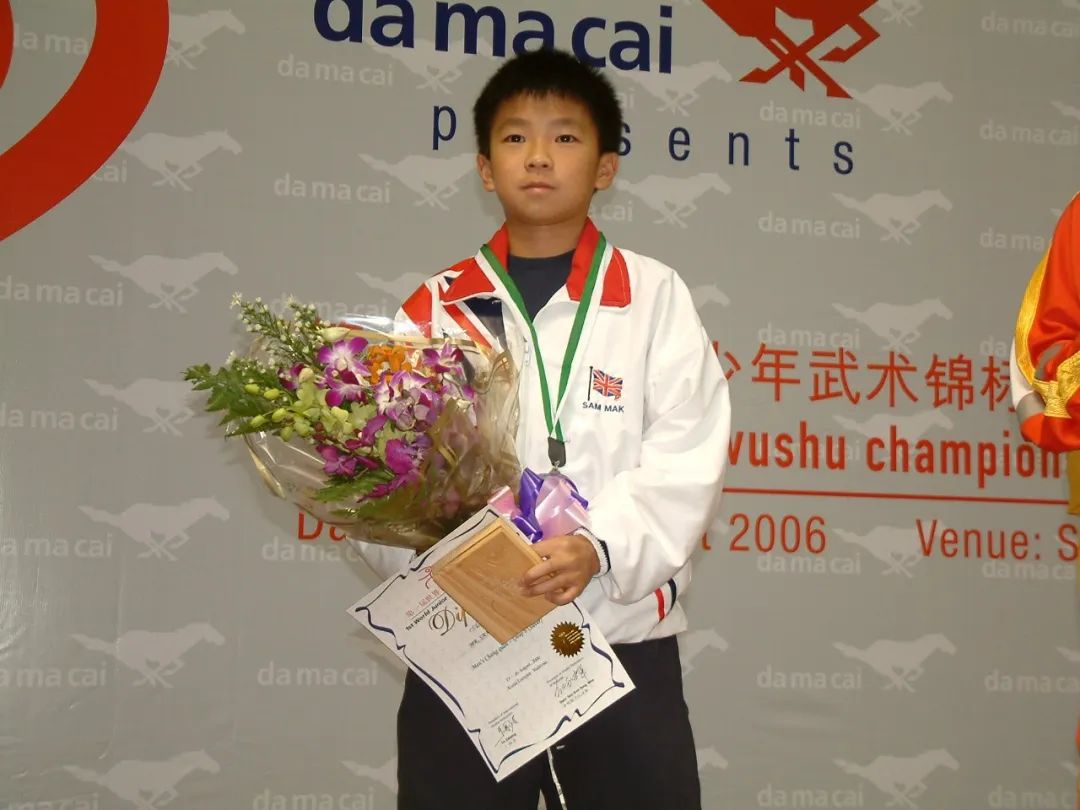
An Odyssey of 4 World Wushu Championships – 2015-2023
After a hiatius due to injury, Sam would return to wushu competition in 2015 as an adult. The next eight years became a wushu odyssey of sorts for him, which has gradually shaped him as an athlete both technically and philosophically. “My whole perception of competition has changed significantly over the course of the years,” he says. “As a junior, there was a desire to win and beat certain athletes. But as I have matured, I realized this was not a healthy mindset.”
Sam’s world championship journey began In Jakarta. “At the 2015 World Championships in Jakarta,” he says, “I was just coming back from 4 years off training having ruptured my ACL in 2010 during the 3 rd World Junior Wushu Championships. In that time, I had two surgeries to fix the knee as well as graduating university. I had huge expectations of myself, especially given the successes in my junior years, and my ambition was to be the first British athlete to medal in taolu at a world championship.”
“However,” Sam continues, “I had not anticipated how fast the standard had improved during my time away and also how different senior nandu competitions were. In addition to that, I was now a working adult with a full-time job and could only train wushu once a week. The reality was that I was a recreational enthusiast, but my expectations were that of a full-time professional athlete. I put too much pressure on myself to live up to these ambitions, resulting in performances that were far below my best.”
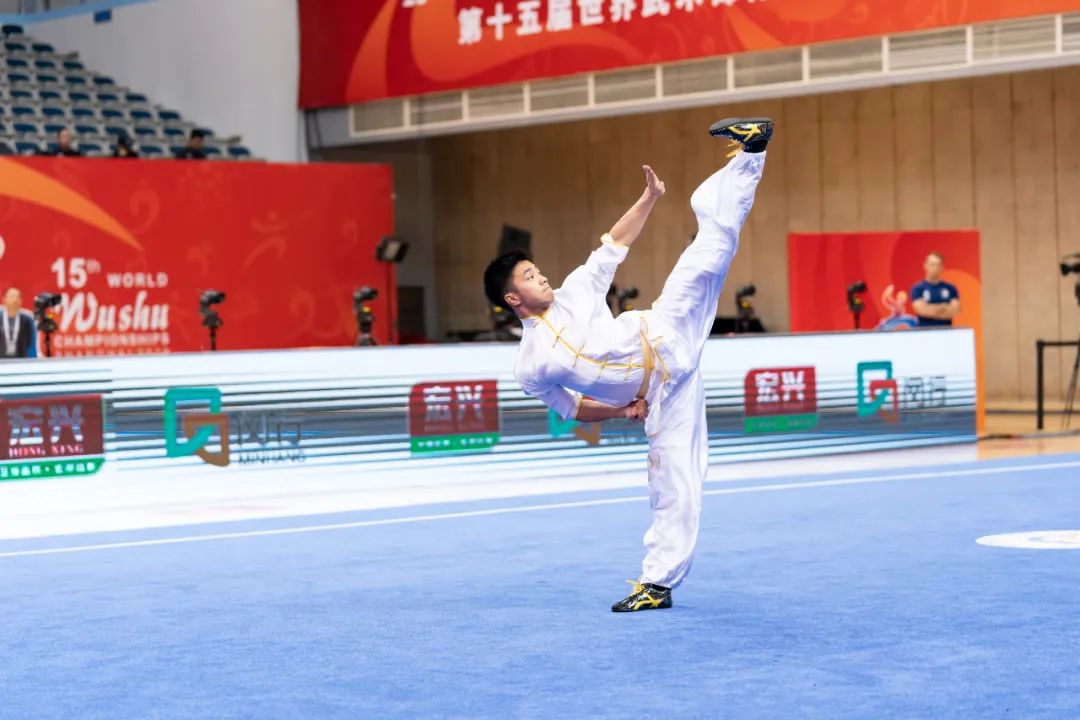
Sam says that it wasn’t until perhaps the COVID years that he began to truly change his thinking. “I had performed fairly well in Shanghai,” he says, “but had made nandu and group A errors. But the pandemic helped me put things into perspective. I slowly began to realize that my happiness and goals should lie in my training and my commitment to wushu — things I can control — rather than a score or a medal – which was out of my control. I attribute this change to the introduction of the Chimp Paradox, a psychological model for confidence and happiness. Once I had truly embraced this approach, I felt a huge sense of relief and I came to Fort Worth the happiest I’ve ever been.”
16 th World Wushu Championships – Challenges, Perseverance and Record-Breaking Triumph
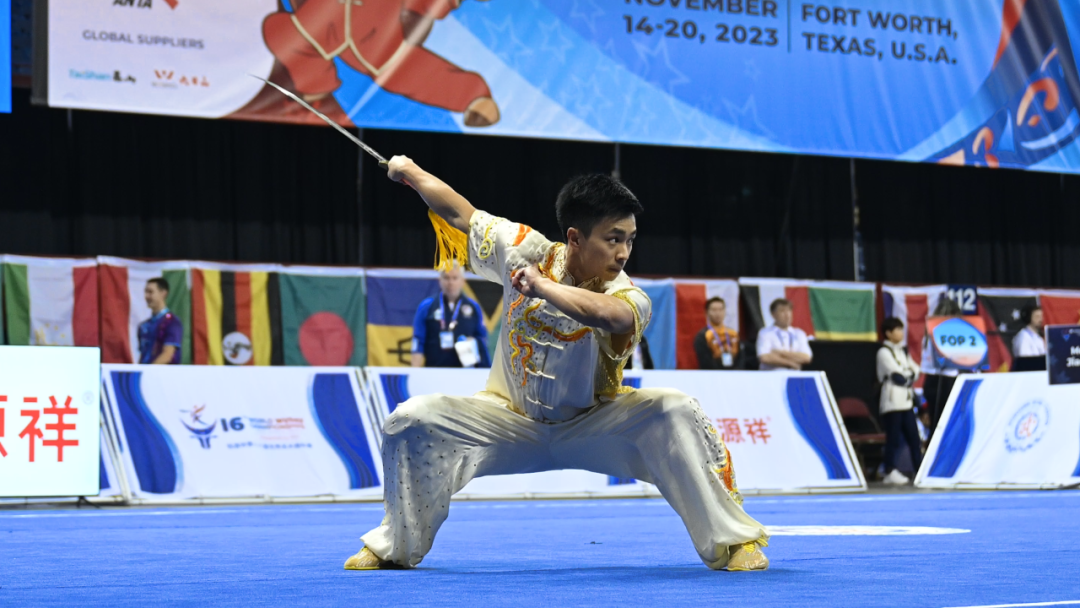
Despite being in top mental shape in 2023, Sam still had to overcome some physical hurdles to get to Fort Worth. “Honestly,” he says, “this was one of the hardest preps I’ve ever had. I had surgery in March to fix an inguinal hernia that was preventing me from training. The recovery took longer than anticipated, to the point where I wasn’t sure if I’d be able to compete and I did hit some very low points. On top of that, since moving to London, I have to drive over 300 miles (about 3 hours one way) to get to and from training. The cost of this travel, from a physical, psychological and financial perspective, mixed in with the frustrations of injuries, made this a very tough year.”
Sam adds, “I had to take a significant amount of time out of wushu to focus on rehab, and then on returning to the carpet, took several months to phase nandu training back in, particularly mabu landings. We only get to train once a week on a Saturday, so every session truly counts. I also got COVID about a month before flying to Dallas which didn’t help.”
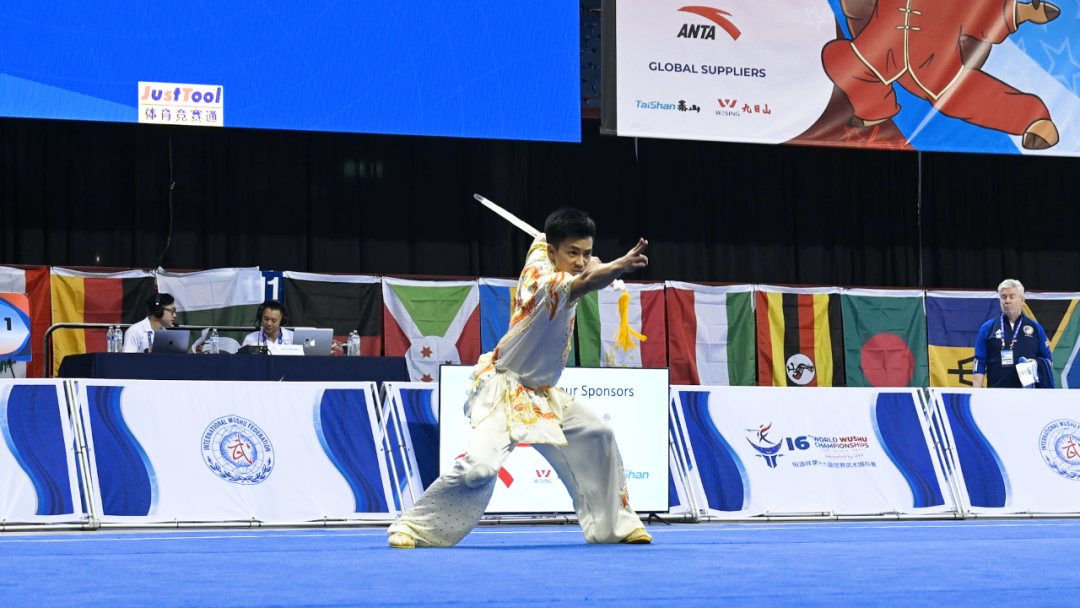
When he got to Texas, Sam was reunited with many of his old and dear wushu friends, and was traveling with a deeply supportive GB team. Reuniting as the wider world wushu community after a long Covid hiatus in competition made it even more meaningful. “The level of wushu in Fort Worth was exceptionally high,” Sam says. “For me, the gap between the top countries and the rest of the world has narrowed significantly while the overall standard continues to rise. It seems that everyone has used the pandemic time to train hard and train smart, which is reflected in the results at the competition.”
“For me personally,” he continues, “I just wanted to go and have the best time in Dallas, and to do what I love doing with my team, my family and most importantly, enjoy the experience. Once I finished changquan, I do have to admit there was a lot of relief that I’d finally performed to the best of my ability at a world championships and that I could finally pay back Mike and my family with a performance worthy of their sacrifice and support. During both jian and qiang, it was the calmest I’ve ever felt competing which allowed me to perform at my best.” Sam’s best reflected in his highest scores ever – a 9.746 in jianshu, landing him in 4 th place, and a 9.723 in qiangshu, for 6 th place.
Reflecting on this, Sam says, “Given our significant lack of training time, our philosophy has always been to maximize group A and group C scores. So, to be completely honest, once I saw that those scores were clean, I didn’t really take notice of the group B score or the placing. It wasn’t until some time after each event, I would look at the full scoreboard to see where I finished and was also told I had broken our national record. Of course, I am extremely proud now looking back but it’s the performance and the journey there that I’m most proud of.”
The Team GB Experience
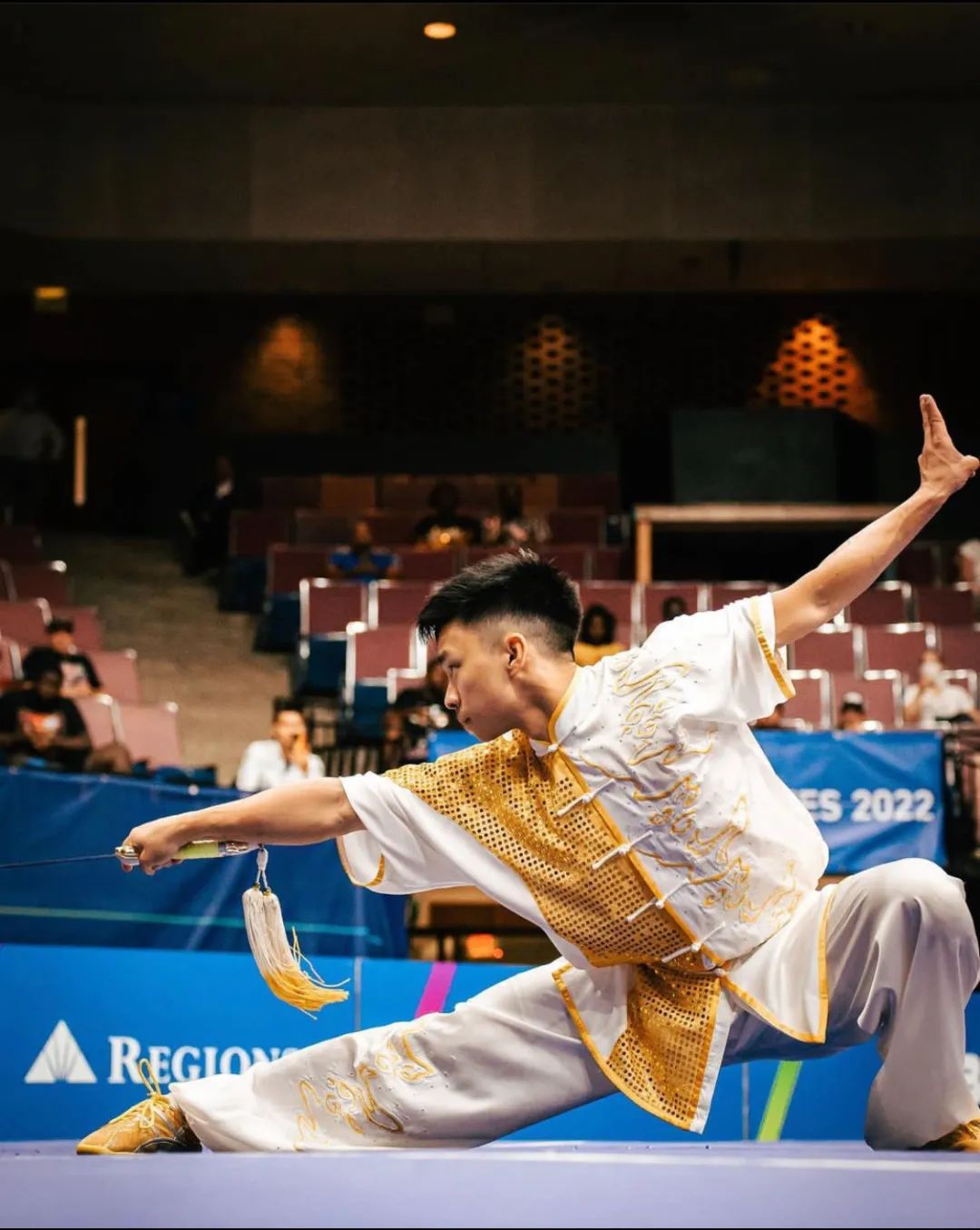
Sam has been a member of the Great Britain team since 2003, and traveled and trained with them over his long wushu career. He says, “Over the years, the GB team has changed so much. I’ve been in teams ranging from just me to full squads. Wushu in this country has never been popular or well-funded so athletes, clubs and coaches come and go all the time. It takes a huge commitment in every aspect of the word to train and compete. However, the two constant presences in my career, outside of my family, have been Mike my coach and Steve Coleman, a GB athlete who I’ve trained with since 2003. Without the two of them, I certainly wouldn’t be where I am now and GB wushu would not exist as it does. My dad, also, has never missed a competition, whether it was a regional competition or a world championship. So whenever we travel for competition, it’s always with family.”
Sam adds, “There’s only one wushu carpet in the country that’s located in Derby and as a squad, the five current members (myself, Steve, Zac, Huicong and Ashley) collectively travel well over 1000 miles to train for 2 hours on a Saturday. This is, by far, the most committed and talented team I’ve ever been part of. There is a huge amount of talent combined with experience in this team and I am excited to train with them every week. We had an unshakable team spirit going to Dallas and the most relaxed atmosphere. I haven’t had as much fun or be as comfortable yet focused in any team before.”
Representing Great Britain at The World Games
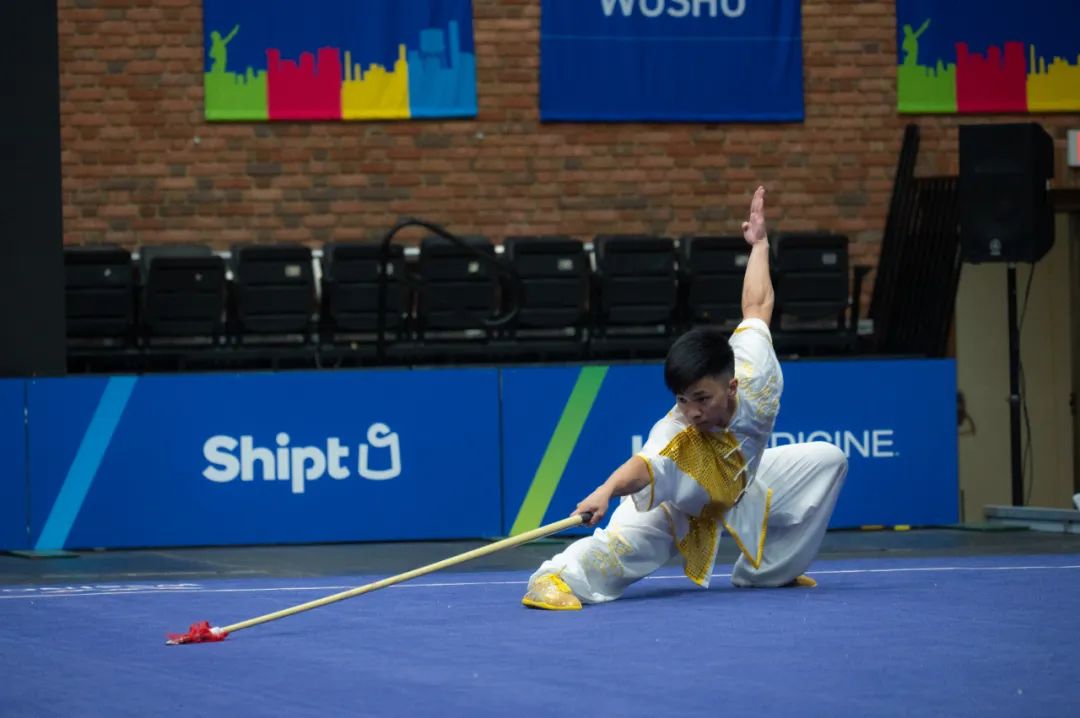
A year prior to the Fort Worth event, Sam was chosen to represent Great Britain at the 2022 World Games in Birmingham, USA, and his impressive performances took 4 th place in jianshu and qiangsu combined. This more streamlined elite event offered Sam a different competition experience. “I had an amazing time at the World Games,” he says. “It felt like a very prestigious event, at such a big multi-sport competition and the whole city hosting events – the closest to the Olympics I might get! More than anything, it was great to see so many familiar faces back on the carpet after the pandemic.”
Sam continues, “The competition felt much more intimate than a world championship. I felt very privileged to be able to represent my country and be amongst some of the best athletes in the world. The standard was of course, extremely high. It was also the first time I had competed in a combined event which was an invaluable experience, especially as I made errors in my first event. So I learned a lot about how to deal with this and how to adapt my approach. This was my first time in the USA and we went to Disney World Florida after, which has always been a dream of mine!”
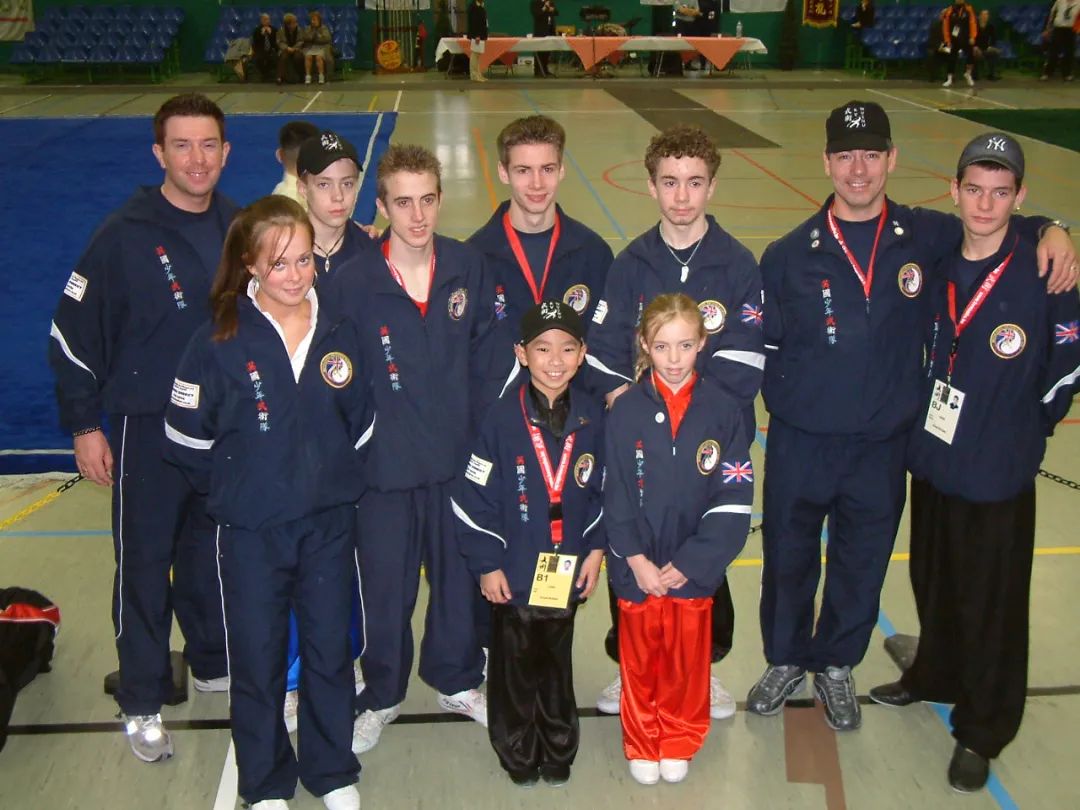
Reflecting on Wushu Through the Years
As a veteran of competition, Sam reflects on some of the changes the sport has undergone since he started out as a kid. “I think the overall standard has improved exponentially over the years,” he says. “With the internet making the world much smaller, people are able to improve their training, conditioning and techniques significantly quicker and easier than before. There is much more accessibility to resources. I remember learning the compulsory routines out of textbooks.”
“The biggest change,” Sam continues, “has been the introduction of nandu scoring. Wushu has never been the same since. It has pushed the physical standard so much. I do wish I could have competed at least once at world level without C scoring. Not that I don’t like nandu, but I fell in love with the movement and techniques of wushu rather than the jumping. The way that competition rules are structured currently, you have to put a huge amount of emphasis on group C training especially when you have limited training time.”
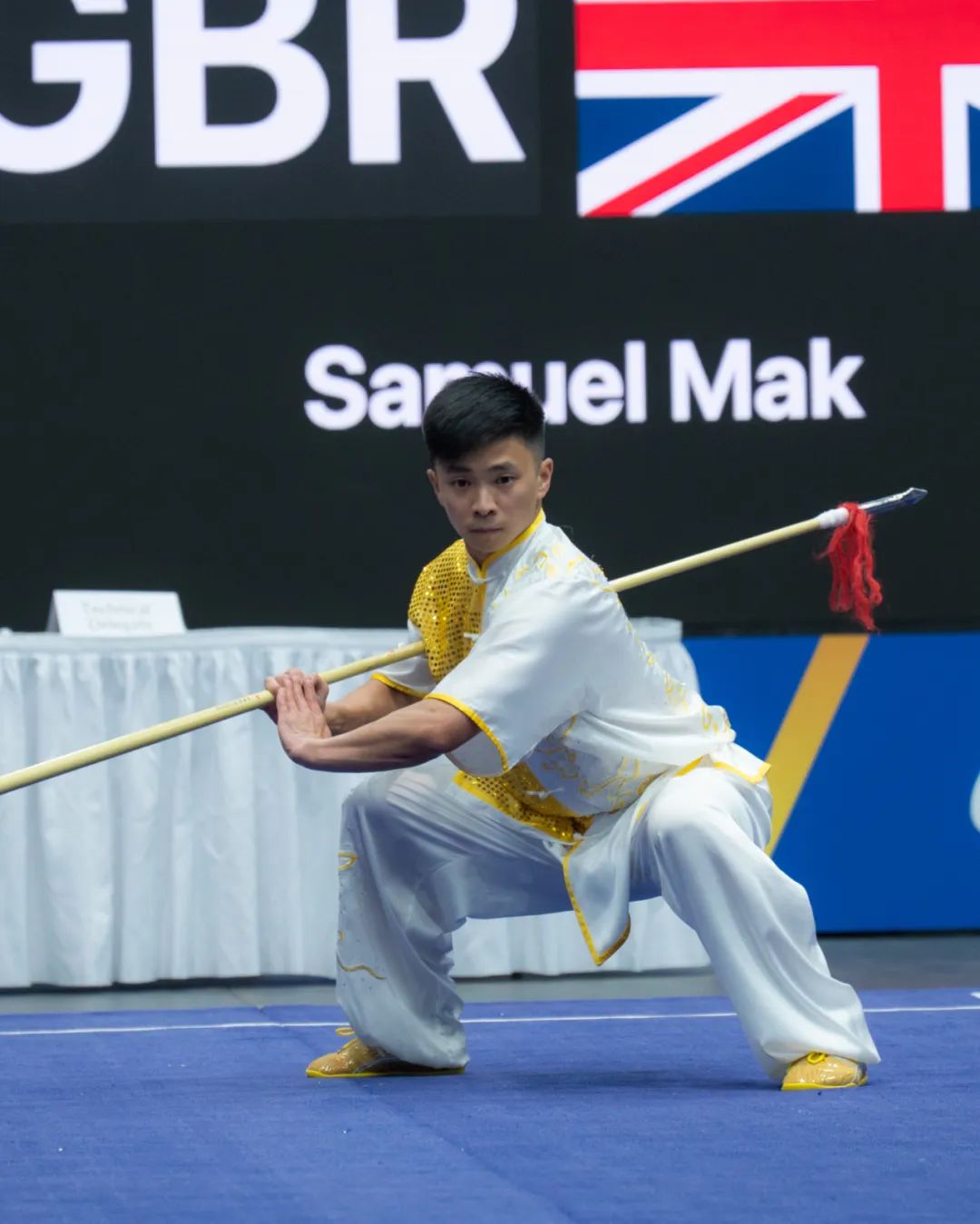
We asked Sam about his chosen disciplines of changquan, and jianshu and qiangshu and why he chose these. He responds, “I think I naturally suited these styles from day one. I did swap between gunshu and qiangshu as a junior but as my movement matured, it was clear qiang suited my style more in terms of how I move with my lines and rhythm. I’m not sure I have the physicality and aggression for modern day dao/gun. I love the movements and techniques of jian and qiang, and particularly the old school style of the 80s from the likes of Liu Qinghua, Jia Ping and Zhao Changjun — meeting him in Dallas was a life highlight for me! There is still a purity with jian and qiang that can exist in modern wushu and I enjoy trying to incorporate that into my routines.”
Sam adds, “I have competed in traditional routines before – pudao, zuijian, mantis, bajiquan. Once I finish competing, I’d love to explore more traditional styles. I’ve always wanted to learn chen style tai-chi!”
Wushu in Great Britain
Wushu has steadily developed in Great Britain and Europe since Sam started his sport career in 2003, scoring many achievements, but also still facing challenges. Regarding these, he says, “When I first started competing, we had a lot of GB junior athletes competing at national level and attending the first few junior European competitions. However, as time went on there were less and less athletes. I think the main issues were a lack of clubs and coaches, especially at an international level and an increasingly high standard at competition. After my last junior world championships in 2010, we did not have a national junior team compete until last year 2022.”
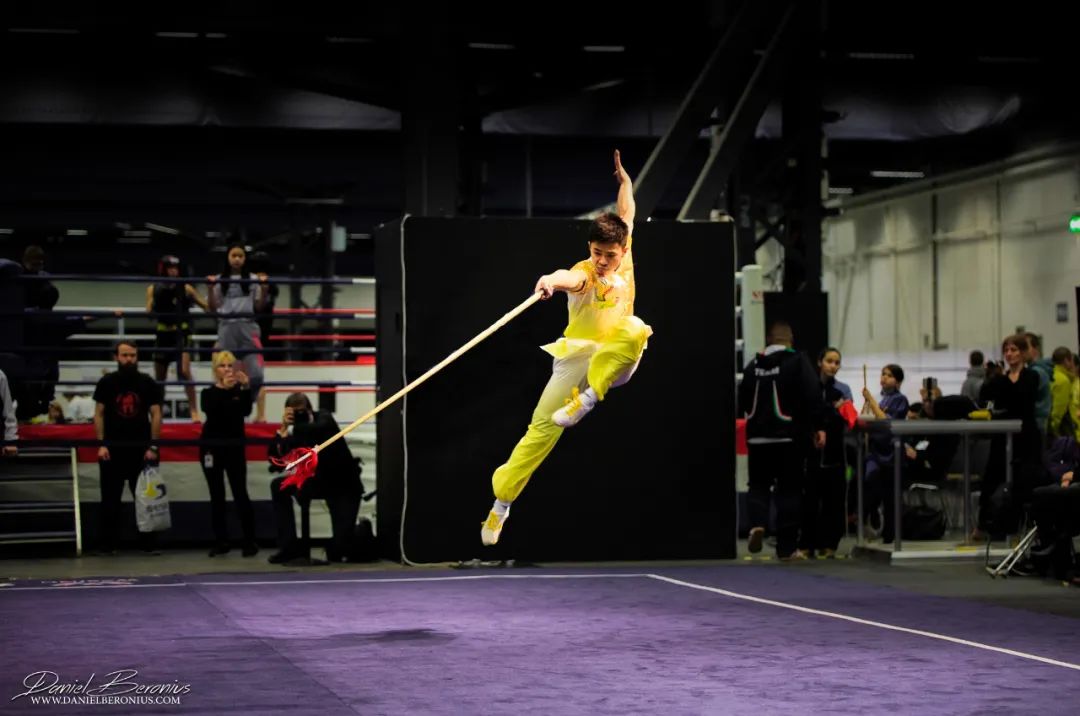
Sam adds, “Thankfully, we now have a group of very talented junior athletes who train together regularly and there is amazing potential for them to progress into senior level. This has come about through the concerted efforts of Mike and a few other clubs in recent years. We have had very little financial support as athletes over the years, and have had to self-fund the majority of costs – training, travel, tracksuits. It has improved slightly more recently with some contributions towards competition fees. Ultimately, without funding, the sport cannot grow in the country as there is little support from a grassroot level right through to elite participation.”
“So in that respect,” Sam concludes, “I think the biggest achievement is actually consistently being able to attend the world championships. Given our lack of resources and difficult training situations, participating competitively at the worlds is already an achievement. But looking at our scores and results in Fort Worth as a team, we have considerably outperformed what our training lifestyle would dictate.”
Wushu Life, Challenges, and Philosophy
For many longtime, dedicated wushu athletes the sport can be life-changing, with both gratifying personal experiences and physical challenges. “Some of my closest friends are from the wushu world,” Sam says. “I think it’s impossible to share the same passions and hardships for over 20 years and not bond. In Europe, there is a small competition circuit so you become friends naturally over time seeing the same people. And of course, Instagram and social media means we can keep in contact with friends from further out in the world very easily now.”
Reflecting more on his wushu life, Sam says, “Overcoming the ACL injury while transitioning into senior competition was very difficult. Having taken so much time off from training, going to university and coming back into competitive training was hard. However, I think the biggest obstacle has been balancing the requirements of competitive training whilst living in London, developing a career, in part to finance wushu, and maintaining relationships and social life. All amateur athletes face these difficulties but to be able to maintain longevity in the sport while
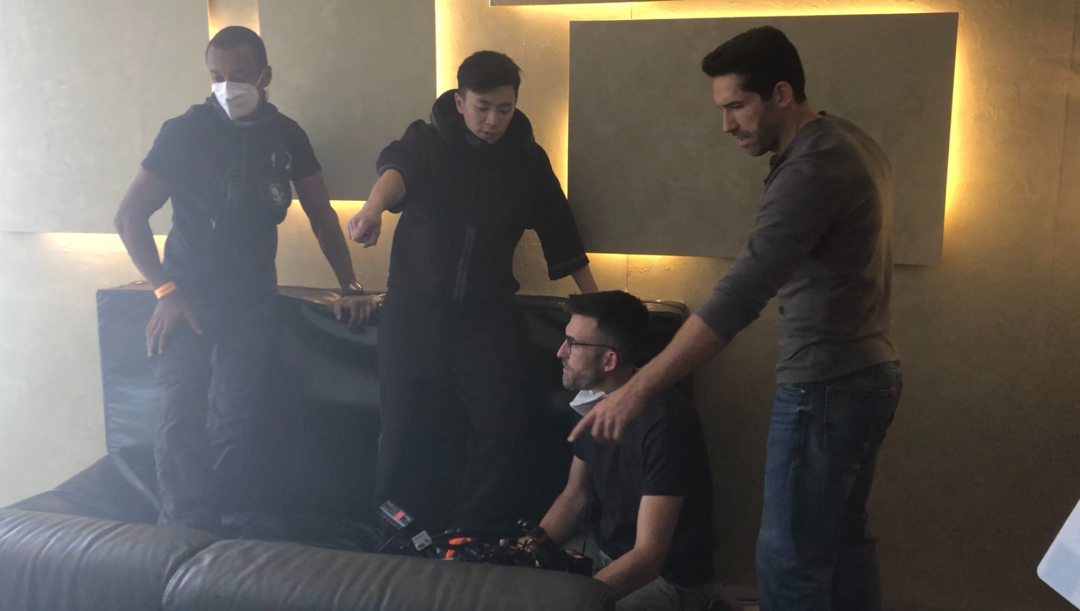
looking after mental health has been the hardest thing to achieve, and it’s an ever-changing ongoing process. I wouldn’t be able to do it without the incredible support network I have around me.”
Sam adds, “I think the best part of being a wushu athlete is the challenge. Whether this is physical or psychological, the sacrifices and commitment needed to be able to perform at the top level are what makes it so rewarding. I think also, at this point in my career, giving back to the community is hugely gratifying. Whether it’s supporting my teammates, mentoring the juniors or sharing knowledge, it’s great to be able to help others achieve their goals using my experiences. My best experience in wushu so far has has been the last world championships. On a personal level, it was the best competition I’ve performed at but more so, it was being on the journey with the team and seeing everyone achieve on the carpet. Every athlete puts so much into their training and being able to see those efforts pay off in competition is the best feeling.
Gratitude for a Coach – And Family
We asked Sam about his coaching throughout his wushu career. Many athletes experience multiple coaches, or go to training camps in China for long months to improve their wushu. Sam, however, has been loyal to only one person throughout his life and career. He tells us a little about his remarkable and dedicated coach. “Mike has been my only coach in my competitive career and I have never trained anywhere else. Without him, I simply wouldn’t be who I am or where I am today. He has been my mentor in wushu and life since I was 5. When we started to train for that first national championships, Mike said that he would never charge me for coaching as long as I trained and competed with him. That has remained the case for the last 20+ years. He doesn’t charge any GB team members and has no financial gain from coaching, but rather he does it out of his passion for the sport and for his athletes.”
Sam adds, “I honestly think it was fate that there was such a dedicated and gifted wushu coach living in the town next to me. He has an incredible attention to detail and is willing to break movements down to the ground in the pursuit of correct technique – hundreds of hours in his garage can testify to that. And, although I hate to admit it, Mike is more often than not behind some of the more interesting choreography ideas in my routines. I count myself and British wushu truly blessed to have him.”
Sam’s family has also been the backbone of his support as a wushu athlete. “From the very beginning,” he recalls, “my family has been fully supportive of my training and wushu ambitions. My dad was an athlete in volleyball during his university years so he appreciates what it takes. He has spent countless hours driving me to and from training, sitting with me in the sessions and travelled the world with me. I hate to think how much money my family has spent over the years to fund my career! They’ve got me through the dark times and have never tried to stop or force me into doing something I don’t want to. Although my mum is now reluctant to watch me compete after seeing me rupture my ACL in 2010. My sister has also been someone I can talk to and approach when times are tough. I could not ask for a better family and wouldn’t be able to achieve what I have without them.”
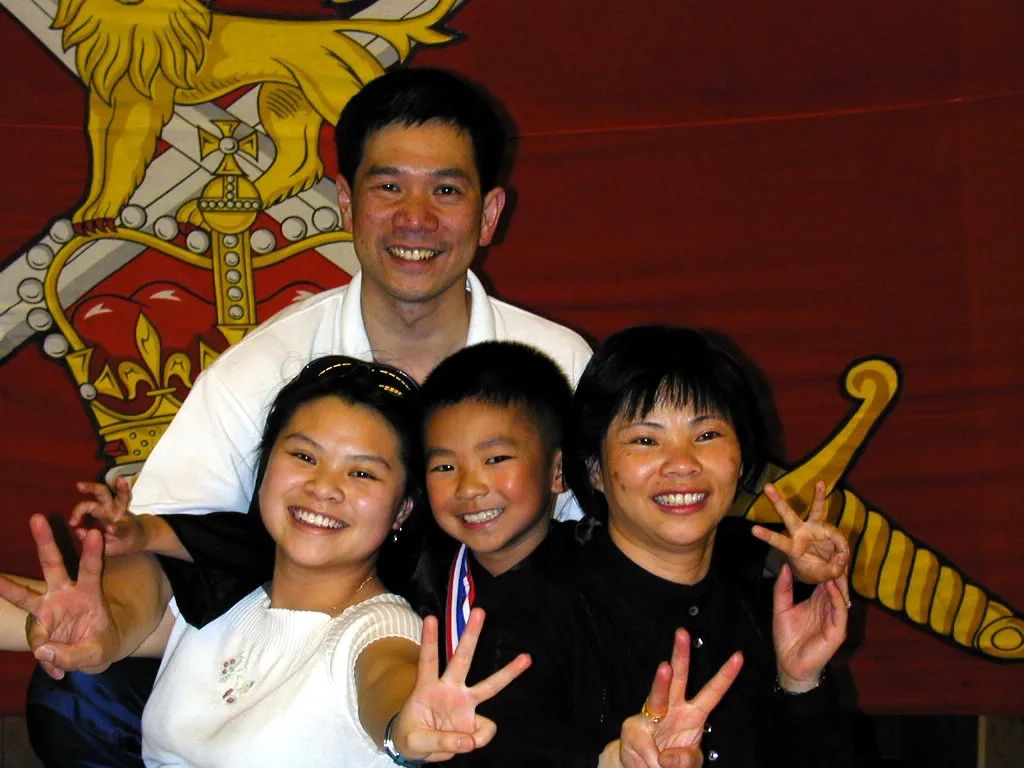
Living in London, and having a lifelong passion for film, Sam has had the opportunity and ambition to integrate his wushu into an acting career, appearing in movies like The World’s End, Tomb Raider and Gangs of London. He tells us how he got started. “I used to train at a local gymnastics club — Damien Walters at Derby Gymnastics — whose members are now among the best stunt performers/action directors in the world. They were working on The World’s End and needed some young-looking performers for a fight sequence so I was invited to take part. That was my first experience of working on a feature film. It was a dream come true and I was even given a bit of wushu style to perform. The stunt coordinator was the late great Brad Allan who of course is well known in the wushu community and an incredible performer.”
Sam adds, “I have been fortunate enough to have worked and learned from some incredible people in the industry during the last few years. Gangs of London was a particular highlight, and working with Gareth Evans and his team was such a privilege. I’m not sure I am in a position to say I am promoting wushu in film right now as I am still finding my feet in the industry, but I certainly hope that one day I will be able to. Movies were one of the main reasons I got into wushu and I hope to follow in the footsteps of the great wushu action stars. It must be time for a Once Upon a Time in China reboot soon!”
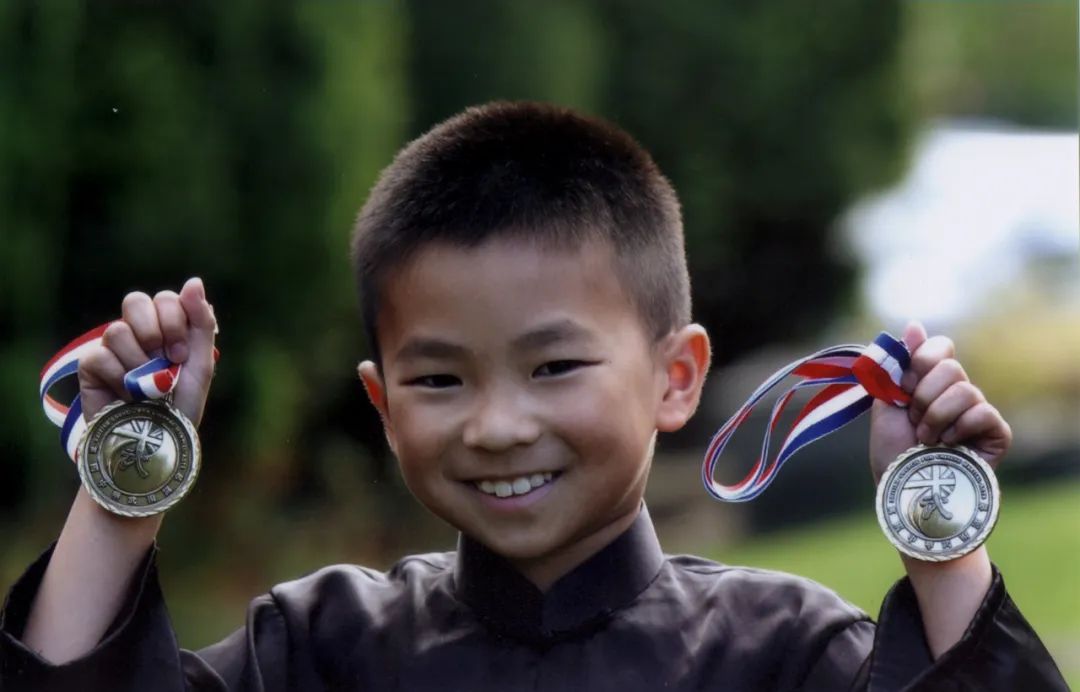
Balancing Wushu, Work and Life
When he’s not training and competing in wushu or making movies, Sam also works as a physiotherapist in London. He says, “I became a physio primarily to look after my wushu injuries! I chose to specialize in the MSK field to help improve my ability to rehabilitate and condition myself for wushu. Since we only train wushu once a week, the majority of my training takes place in a gym and centers around strength and conditioning. I try and fit in whatever wushu I can in the space I have. But having the physiotherapy background has helped make conditioning more efficient, so that I can maximize the little carpet time we do get. I am a huge advocate for strength and conditioning, especially for the amateur athlete and try to promote these habits as much as possible. Train smart, then train hard. “
Sam adds, “Balancing work and life and training has always been difficult. I went self-employed several years ago so that I could try and make more time for training and be on my own schedule. Although this has given me some more freedom, it comes with other caveats, such as financial pressures and irregular work life. I find that it’s important to make sure there is time to relax and enjoy life. Sometimes I still don’t get the balance quite right. Wushu basically consumes most of my time! But outside of that, I like to spend as much time as I can with my partner Ai Ru, whether that’s eating out or watching movies at home. We also have a hamster to look after! And of course, watching movies. I love watching as many different films as I can and attending acting classes. One of my goals for next year is to write and shoot a short film of my own.”
